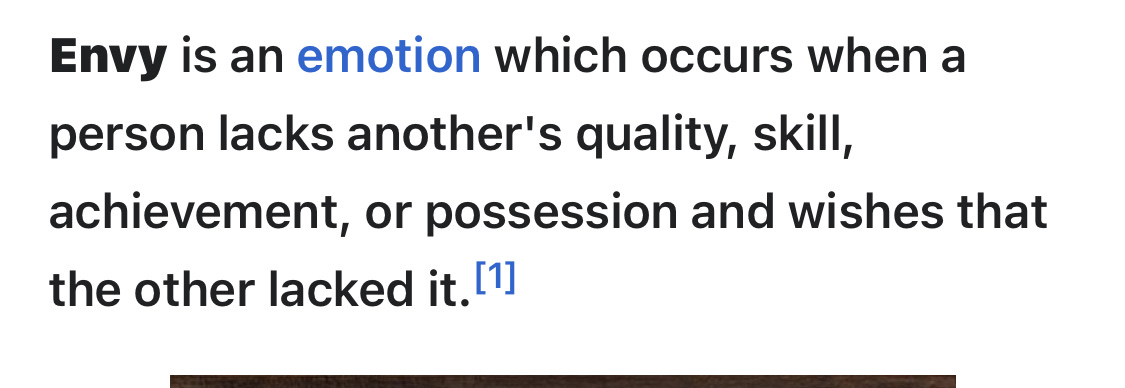Narcissists and Toxic People Target 3 Kinds of People
They target by abuse, insults, sabotage, and character attacks on those they are envious of - especially those who have the character qualities they lack but wish they had.
The toxic or narcissistic person is an ENVIOUS person. They are especially envious of character qualities that they wish they had but do not - but see in YOU. A healthy thinking person would work on themselves to develop the character quality they see in you that they would also like to possess. But a toxic or narcissistic person is psychologically lazy - so they decide to try to destroy your character by speaking badly about you, insulting you, being condescending and patronizing toward you, questioning you and your decisions and choices and hoping they can make you less confident in your self and your abilities. They want to take you down.
Being rude, condescending, critical, and self-righteous all scream insecurity. Toxic and narcissitic people are insecure which makes them envious. Toxic people may appear to have high self-confidence - but it’s a mask. Covert narcissists appear humble and to have less confidence than overt narcissists, but they still act in these insecure ways because they believe they must try to make you less confident as they feel that will make them appear more confident.
True self-confidence is actually high self-compassion which allows for the high compassion of others as well. A chronically rude, condescending, critical, and self-righeous person shows you their lack of compassion. That’s how you can know who is truly confident and who is pretending. Truly confident people are truly compassionate people who encompass the following 3 character traits.
The 3 Kinds of People Narcissistic and Toxic People Target
High Emotional Intelligence. They dislike people with high emotional intelligence because this is a developed quality and character trait that encompasses empathy, self-awareness, awareness of other’s thoughts and feelings, tolerance for different opinions/beliefs, compassion and high self-compassion, an ability to accept responsibility for own mistakes and forgive others, an ability to see everyone as an equal, not inferior or superior, an ability to self-regulate and control emotional reactions, curiosity about the differences of others, and a willingness to build up others with their words and actions. A toxic or narcissistic person can have emotional intelligence - in that they are very aware of what another person needs (think of a cult leader) but instead of using their awareness for the good - to build a person up, they use it for evil - to tear the person down and put themselves in a superior position.
High Empathy. They dislike people who have high empathy because they are only capable of a small amount of empathy. Empathy is being able to identify and understand other’s feeling and emotions - even if that person or group is not experiencing something that directly affects them nor is it something they have had or have to deal with. A person with high empathy cares about the situations and feelings of others regardless. Toxic or narcissistic people are not capable of maintaining empathy for other people - especially others who not in their same situation. Their empathy fades because they most care about how they are being affected by others, not how others are affected. They are self-involved and annoyed if others problems affect them negatively. For example, they lose empathy quickly for a sick or chronically ill spouse/friend/employee/family member because that person is not able to cater to them. High empathy is not compatible with that mindset.
Steady in Love. Unconditional love is the perfect God/Jesus love and though we want to love others like that, most, if not all of us, are lacking that kind of love - maybe until Jesus comes. But there are those who continue growing in love and developing their emotional intelligence and empathy and choosing to care about how others are affected by their actions and words. No one is perfect - but people who are steady in love, keep choosing to be loving despite whether or not they feel someone “deserves” their love or care or compassion. Healthy people’s motto is “you can love everyone but from different distances” because they understand that everyone deserves love simply because they are human, but some people will target them and some people are too emotionally unhealthy to be in their inner circle or even around them. Healthy people have boundaries but forgive and wish people well from a far. They do not wish them ill nor do they try to sabotage the character or reputation of another person unnecessarily. Love does not mean like; we do not need to like others to love them. We can set boundaries on bad behavior and words and may need to set physical boundaries of not seeing someone - but can still love them and not hurt them or want to see them hurt.
Unfortunately, many people get hurt, abused, or lose heart and faith in God/Jesus because of the actions and words of the people in a church/religion/spiritual community. Christians and non-Christians alike can be toxic and narcissistic. People are not a good representation of Jesus, and even though we are supposed to be growing in emotional maturity to become like Christ, we are not there yet.
Being saved does not mean someone’s character changed - though it does for some people. Emotional maturity requires growth and hard work on ourselves and the Bible teaches us to grow in our knowledge and understanding of Jesus and our minds will become more like Jesus as we choose healthy and healing ways of being and interacting with others. Emotional immaturity inside and outside the church is more rampant than maturity.
Self-righteousness is the false confidence “of one's own righteousness, especially when smugly moralistic and intolerant of the opinions and behavior of others” (dictionary.com). Smugness is ugly. A smug person assumes superiority over others and are usually the hardest types of people to be around. They enjoy tearing others down - especially behind their back - some Christians do this in the name of “needing to pray for ___” - but they may just want to make that person look bad by talking bad about them to others. People try to justify their behaviors however they can, but talking bad about someone is gossip. We are all guilty of this sometimes. Some people directly target Christians and ironically, do not understand they are also being self-righteous in doing that. None of us, Christian or not, are superior to anyone else.
Self-righteous people are ignorant of what love or Christianity is supposed to be and instead use their trauma to hurt others rather than help them. “You will never measure up to my standards”, is their internal dialogue on those they target. Toxicity and Narcissism stem from childhood trauma. People who heal, build others up. But it takes humility and an understanding that mistakes are okay and no one is perfect and may take years of hard work on themselves to heal. Self-righteous people often play the victim or are so deep into their narcissism that they truly believe they are superior to others and that others are inferior in their thinking because of their moral flaws - of which they feel they have none - or many less than you.
We are all great lawyers for ourselves and great judges for others if we let ourselves become smug and self-righteous.
Jesus said in the Bible, that all the laws could be summed up by these two commandments (Matthew 22: 37-40)
You shall love your God with all your heart, and with all your soul and with all your mind.
You shall love your neighbor as yourself.
Neighbor means all people. If we want to love other people well, then we have to love ourselves well first. High self-compassion is high self-esteem/self-confidence. How to Develop High Self-Esteem: Which is Actually High Self-Compassion.
Secure, loving, empathetic, emotionally intelligent, confident people who love themselves and others well - will not “target” anyone and will not be chronically rude, condescending, or self-righteous to others face or behind their back (though we all occasionally make these mistakes - none of us are perfect).
Many toxic and narcissistic people choose family members, those close to them, a spouse, partner, child, in-law, or friend to be their target. They also choose employees or co-workers. These unhappy, insecure people always find a target somewhere. Otherwise, they would have to face their own flaws instead of focusing on yours.
If you are a target of someone, know that it may be because you are being exactly who they wish they could be, but cannot. You are not the problem and not being perfect is not a problem. Targets who do not heal become toxic and narcissistic themselves. Always choose healing. Counseling is a good start and so is learning about emotional abuse and overt and covert narcissism. I recommend Surviving Narcissism with Dr. Les Carter. They usually target those without good boundaries as well. Dr. Henry Cloud has an entire site dedicated to developing Boundaries. I also recommend his book Boundaries.
Healed targets of narcissistic and toxic people are the best kinds of people. Those 3 traits that made them a target, also make them the most loving people on earth. So, if you have been or are a target, you are on the right track! Learning boundaries will stop these people from being a chronic problem in your life so you can continue being the loving, kind person you are. Good will always have to fight evil.
If you find that you were a target in childhood and that you have become a narcissistic or toxic person because of that, there is hope for you too. You can change and heal and become like the people you target. Counseling is a good start. An ability to take an honest look at how you interact with others and how your actions affect others will be necessary, but with a lot of hard work, you can heal. Narcissists and toxic people can heal when they choose to and put in years of hard work. Many narcissists and toxic people make false promises to heal and their changes last only a short time. Consistent changed behavior and words over a long time (years) will be the result of a truly changed person.







This article helps me catch myself doing dumb stuff in comments sections. Sometimes I rationalize a harsh response because “the idiot deserves it.” Luckily, I pause and edit before hitting send. Most of the time.
You nailed it, Tara. I documented my own experience of being sabotaged by a narcissist with histrionic personality disorder and paranoid delusions in this piece:
• https://margaretannaalice.substack.com/p/how-to-be-an-upstander